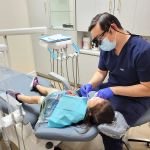Orthodontic Care Tips
- 1. The Importance of Orthodontic Care
- 2. Top Orthodontic Care Tips for Maintaining Braces
- 3. Dietary Tips for Orthodontic Care
- 4. Oral Hygiene Routines for Orthodontic Patients
- 5. Common Mistakes to Avoid with Orthodontic Care
- 6. Real-Life Experiences in Orthodontic Care
1. The Importance of Orthodontic Care
Orthodontic care plays a vital role in ensuring that your teeth remain healthy, properly aligned, and functional. While the main goal of orthodontics is to straighten teeth and correct bite issues, maintaining proper care throughout the treatment process is just as important. Proper orthodontic care helps avoid complications such as tooth decay, gum disease, and jaw problems. It also ensures that you get the most out of your investment in braces, retainers, or other orthodontic appliances.
Orthodontic treatments, whether they involve traditional metal braces or newer clear aligners, require careful attention. Not only do you need to keep your teeth clean, but you must also follow specific guidelines to protect your braces and other appliances from damage. In this article, we’ll cover some essential orthodontic care tips to help you maintain the health and effectiveness of your treatment.
2. Top Orthodontic Care Tips for Maintaining Braces
Braces require ongoing maintenance and care to ensure that they work effectively. Here are some orthodontic care tips to keep in mind for maintaining your braces:
2.1. Brush Your Teeth Regularly
One of the most important aspects of orthodontic care is maintaining good oral hygiene. Brushing your teeth regularly is essential to prevent plaque buildup around your braces. Make sure to brush your teeth at least twice a day, using a soft-bristled toothbrush. Be sure to brush around each bracket and wire carefully, as food particles can easily get trapped in these areas.
2.2. Use Orthodontic-Friendly Toothpaste
Orthodontic care is easier when you use the right products. Choose a fluoride toothpaste designed for orthodontic patients to help keep your teeth strong and healthy. Fluoride helps prevent cavities, and orthodontic-friendly toothpaste typically has a formula that’s gentler on braces while still providing maximum cleaning power.
2.3. Schedule Regular Orthodontic Check-Ups
Regular check-ups with your orthodontist are essential to track the progress of your treatment. These appointments allow your orthodontist to make necessary adjustments to your braces and ensure that everything is moving as it should. Missing appointments can delay your treatment or lead to complications, so be sure to stick to your schedule.
3. Dietary Tips for Orthodontic Care
Your diet plays a crucial role in how well your braces function. Certain foods can cause damage to your braces or lead to dental issues if you’re not careful. Follow these dietary tips to protect your braces and maintain optimal oral health:
3.1. Avoid Sticky and Hard Foods
Foods like caramel, taffy, and nuts can get stuck in your braces, making it difficult to clean your teeth properly. Additionally, hard foods like apples, popcorn kernels, or ice cubes can damage or break the brackets or wires of your braces. Avoiding these foods will help prevent unnecessary repairs and ensure your treatment progresses smoothly.
3.2. Cut Your Food into Smaller Pieces
When eating foods like fruits, vegetables, or meats, consider cutting them into smaller pieces to avoid putting pressure on your braces. This is especially important when it comes to crunchy or chewy foods. Cutting your food into bite-sized pieces will minimize the risk of damaging your braces and make it easier to chew.
3.3. Drink Plenty of Water
Drinking water helps rinse away food particles that may get stuck in your braces. It also helps maintain overall oral health by keeping your mouth hydrated and promoting saliva production, which is essential for neutralizing acids and preventing tooth decay.
4. Oral Hygiene Routines for Orthodontic Patients
Proper oral hygiene is essential when you have braces, as the brackets and wires can trap food particles and plaque. Follow these essential hygiene steps to keep your teeth and braces clean:
4.1. Use Interdental Brushes
Regular toothbrushes can’t always reach between the brackets and wires, which is why orthodontic care includes using interdental brushes. These small, specialized brushes allow you to clean the hard-to-reach areas between your braces and teeth. Use them to remove any debris and plaque buildup that your regular toothbrush may miss.
4.2. Floss Daily with Orthodontic Floss
Flossing with braces can be challenging, but it’s crucial for preventing cavities and gum disease. Use orthodontic floss or floss threaders to get between the wires and brackets. Make sure to floss daily to keep your gums healthy and your teeth free of plaque buildup.
4.3. Rinse with Mouthwash
In addition to brushing and flossing, using mouthwash can help reduce bacteria in your mouth and freshen your breath. Look for mouthwashes that are alcohol-free and designed for use with braces, as they are less likely to irritate your gums and mouth.
5. Common Mistakes to Avoid with Orthodontic Care
While orthodontic care is straightforward, many patients make mistakes that can slow their progress or lead to complications. Here are some common mistakes to avoid:
5.1. Neglecting Oral Hygiene
One of the most common mistakes patients make is neglecting their oral hygiene. Braces require more attention to cleaning, so make sure you’re brushing and flossing regularly. Failing to do so can lead to cavities, gum disease, and stains on your teeth.
5.2. Not Following Your Orthodontist's Instructions
Orthodontists provide specific instructions for wearing retainers, using elastics, or making adjustments to your braces. Not following these instructions can cause delays in your treatment or may require additional visits. It’s important to listen to your orthodontist and follow their guidance for the best results.
5.3. Eating the Wrong Foods
As mentioned earlier, eating sticky, crunchy, or hard foods can damage your braces or cause discomfort. Always make sure to follow your orthodontist’s dietary recommendations to avoid complications during your treatment.
6. Real-Life Experiences in Orthodontic Care
Many patients have shared their positive experiences with proper orthodontic care. For instance, John, a teenager from New York, was diligent about following his orthodontist’s care tips. As a result, his braces treatment took less time than expected, and he was able to enjoy a beautiful smile in just 18 months.
Similarly, Emily, an adult patient, struggled with maintaining proper hygiene at first but quickly adapted after receiving advice from her orthodontist. She shared that with proper care and commitment to her routine, she felt confident during her treatment and saw noticeable improvements in her smile.







 Baystate Family Dental4.0 (27 review)
Baystate Family Dental4.0 (27 review) CAMcare Health Corporation- Clementon4.0 (341 review)
CAMcare Health Corporation- Clementon4.0 (341 review) NuSet Dental Implants and Oral Surgery of Scottsdale4.0 (20 review)
NuSet Dental Implants and Oral Surgery of Scottsdale4.0 (20 review) Hillside Dental Care4.0 (192 review)
Hillside Dental Care4.0 (192 review) Brazos Valley Oral & Maxillofacial Surgery5.0 (1756 review)
Brazos Valley Oral & Maxillofacial Surgery5.0 (1756 review) Everglow Family Dentistry - Corona, CA5.0 (62 review)
Everglow Family Dentistry - Corona, CA5.0 (62 review) The Importance of Oral Health Education During Pregnancy for a Healthy Pregnancy
The Importance of Oral Health Education During Pregnancy for a Healthy Pregnancy Best Tips for Brushing Your Teeth Properly for Healthy Gums: Essential Techniques for Oral Health
Best Tips for Brushing Your Teeth Properly for Healthy Gums: Essential Techniques for Oral Health Why Skipping Dental Checkups Can Lead to Bigger Oral Health Problems
Why Skipping Dental Checkups Can Lead to Bigger Oral Health Problems Advantages of Porcelain Dental Restorations
Advantages of Porcelain Dental Restorations How Can Diabetes Cause Tooth and Gum Problems? Preventing and Managing Oral Health Issues
How Can Diabetes Cause Tooth and Gum Problems? Preventing and Managing Oral Health Issues Healthy Habits for Promoting Good Oral Health and Hygiene: Tips for a Healthy Smile
Healthy Habits for Promoting Good Oral Health and Hygiene: Tips for a Healthy Smile